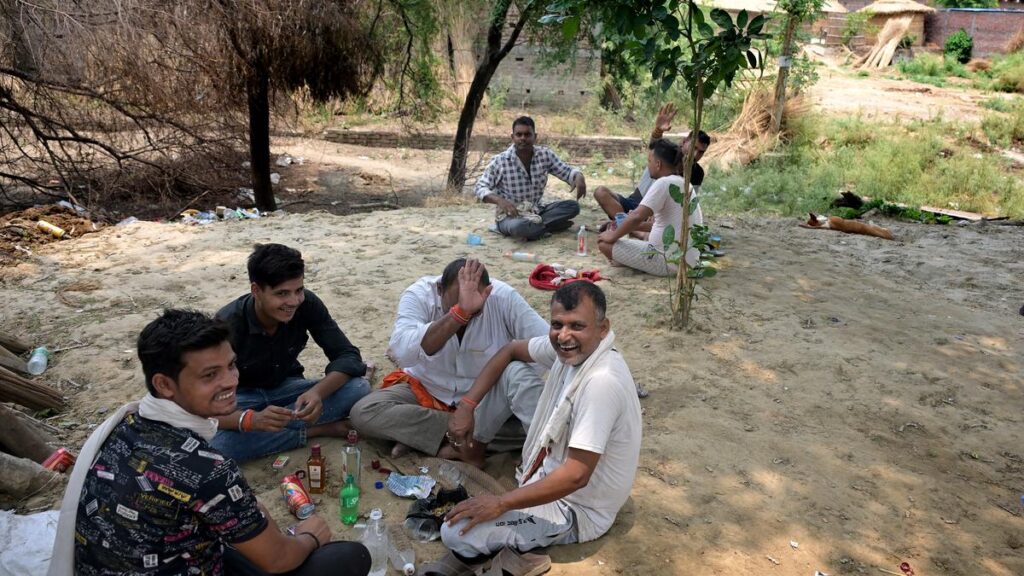In Bihar’s Jawahi Diyar village along the border of Uttar Pradesh, life flows on an even keel. And so does liquor. While Bihar was declared a dry State in 2016, liquor flows freely in the riverine village, blurring the State borders, literally.
With the arrival of noon, the remote village in Buxar district becomes a centre of activity. At times, too much activity — something that has become difficult for villagers like 68-year-old Awadh Bihari Yadav and his sons to ignore.
While a portion of Mr. Yadav’s humble home with unplastered walls lies in Buxar district of Bihar, the rest falls in Ballia district of neighbouring Uttar Pradesh. “The village youth often go across the border to get drunk and even smuggle in bottles,” says Satyendra, 30, Mr. Yadav’s youngest son, a farmer.
Not too far from their house is a liquor shop, announcing its presence with a red signboard hanging on a brick wall: ‘Composite English/Beer Wine Shop’. Bottles and cash are exchanged through a single iron-grilled window. At the bend in the road that leads to the shop is a small shack that sells snacks.
It’s around 1 p.m. on a scorching June afternoon, but there are groups of men in their 20s sitting and drinking. They occasionally disperse on their motorcycles when they see a car with Bihar registration number. The man behind the counter is quick to reassure. “Don’t worry, this liquor shop is in U.P. and there is no ban on liquor here,” he says, wishing to remain anonymous. As an afterthought, he adds, “The shop is owned by a person living in the neighbouring Ghazipur district, U.P.”
In April 2016, Chief Minister Nitish Kumar banned the sale of alcohol in Bihar. With that, buying, selling, manufacturing, and consumption of liquor became prohibited in the State. If the law is violated, the Bihar Prohibition and Excise Act, 2016, stipulates strict action, including a jail term.
The prohibition
However, hundreds of people, including police personnel have been caught for their involvement in the illicit liquor business. A month ago, 40 cartons of liquor were caught in an ambulance in Muzaffarpur district. In January, three policemen were caught for storing liquor in the Sultanganj police station in Patna. Two years ago, liquor was being sold from the Hajipur police station in Vaishali district. Liquor is smuggled from all neighbouring States, including some that don’t share borders with it, like Haryana. Nepal, with which Bihar shares an international border, is another go-to place for liquor smuggling.
In Jawahi Diyar, there is no barricade on the border that would have forced vehicles to slow down. On the Bihar side, the police stay at the Panchayat Bhawan, 200 meters away from the road that goes from Bihar to U.P. Around four police personnel operate out of here.
The village, with 10,000-odd adults, is on the banks of the Ganga. Due to its riverine location, the village floods each year during the monsoon. “We face two kinds of problems: seasonal displacement during the floods each year, and liquor,” says Mr. Satyendra.
The nearest police station on the Bihar side is about 5 km away, at Brahampur, while in U.P. it is at Haldi, 15-20 km away. “If some serious crimes like murder or dacoity take place in a house located in the village, the police first have to confirm whether it happened on the Bihar or U.P. side,” says another villager, wishing not to be named.
The liquor store is open from 10 a.m. to 10 p.m. every day, he adds. “Some of those drinking are also engaged in the illicit trade of bottles to Bihar and are dangerous people,” he says, adding that there is a nexus between the police and the Bihar Excise Department. “Who doesn’t want quick money in life?” he says.
Karan Choubey, 35, another villager, points a finger towards some houses larger than the others. “A few houses like these have been constructed overnight in the village,” says Mr. Choubey, hinting at illegal source of income, mainly though liquor smuggling.
Strict vigil
According to the police, however, they are patrolling hard. “We are plugging holes on the borders in partnership with the State Prohibition and Excise Department. We have also sent a proposal to the State government to hand over prohibition matters to us from the CID (Crime Investigation Department) wing,” Bihar Additional Director General of Police Kundan Krishnan tells The Hindu. About the missing barricade on the border of Jawahi Diyar village, the officer says, “There is a department [the State Prohibition, Excise and Registration Department, which usually puts up checkpoint by placing iron barriers] in Jawahi Diyar village too… I’ve no idea why it has been removed.”
As per a report recently released by Bihar’s Prohibition and Excise Department “from April 5, 2016 until March this year, out of 84 checkpoints, 67 are inter-State, set up to prevent the influx of banned liquor in the State”.
The report also states that as many as 9.36 lakh cases of prohibition law violations were registered in the State since April 2016, leading to the arrest of 14 lakh people. “As many as 4.18 lakh cases were disposed of by special excise courts with 4.16 lakh convictions,” the report adds. The excise and police departments together, according to the report, seized 3.86 crore litres of illicit liquor.
Rashtriya Janata Dal leader and Leader of the Opposition in the Bihar Assembly Tejashwi Yadav often criticises the State government, saying that the “prohibition has completely failed in Bihar”.
The Chief Minister, though, continues to caution people with his oft-repeated “Piyoge to maroge (if you drink, you die)” dictum and that his government would continue with prohibition, come what may.
Published – June 05, 2025 12:39 am IST
Source:https://www.thehindu.com/news/national/bihar/drop-by-drop-how-the-border-between-bihar-and-up-blurs-in-jawahi-diyar-village/article69658289.ece

